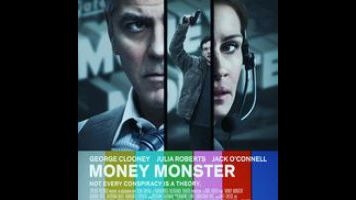“I haven’t eaten dinner alone since the ’90s,” says TV personality Lee Gates (George Clooney), as a means of chiding his no-nonsense, no-dining-companion producer Patty Fenn (Julia Roberts) early in Jodie Foster’s Money Monster. Despite what the film considers an of-the-moment hook, it’s this line of dialogue that most clearly establishes a contemporary setting. Otherwise, Money Monster could pass for a 1998 prestige picture pretty handily, from the way it casts Clooney as the charismatic host of a morally questionable cable TV show, to its teaming of him with former superstars Roberts (behind the pretend camera) and Foster (behind the real one), right down to the TriStar Pictures logo resurrected for the opening credits. Although Money Monster wants to situate itself in the aftermath of the 2008 financial crisis, it instead takes place in an alternate world where Clooney’s instincts for socially conscious drama were never shaped or guided by the sure hands of Steven Soderbergh.
To be sure, this is a chilling dystopia, where screenwriters with seemingly little knowledge of this country’s financial systems are allowed to pontificate about where it all went wrong. The answer, naturally, is a cable TV show. Clooney’s Lee Gates is a Jim Cramer type, doling out ironic dance moves, softball interviews, and stock tips on his Mad Money-like program, Money Monster. Patty is the only one who gives it to him straight, though in this case “it” primarily refers to dreadfully low-energy quips about his short attention span and nonstop yammering. The crew is early into a live episode of Money Monster, coping with a guest’s last-minute cancellation, when Kyle (Jack O’Connell) bursts onto the set, armed with a gun and a vest bomb, demanding accountability for the personal nest egg he just lost on one of Lee’s stock tips. Kyle also insists that the cameras keep running, holding Lee hostage with Patty along for the ride.
It’s at this point that Money Monster should turn into some kind of a nail-biter, but Foster, a novice at suspenseful filmmaking, doesn’t seem to know which screws to tighten or if screws even need tightening at all. Why bother to ratchet up suspense over Kyle’s desperation when you have cutting-edge satire of callow financial gurus and the insidious phenomenon of flashy cable television? For example, Lee’s Money Monster show is so irreverent, it uses clips from old movies to punctuate his announcements. Similarly, Foster’s Money Monster movie is so tapped into the zeitgeist that it includes shots that zoom into digital guts and wires, revealing the galvanizing truth that our money is really just ones and zeroes on today’s information superhighway.
With its cultural and satirical details firmly rooted in the previous century, Money Monster might have been better served by going fully (rather than accidentally) retro. It certainly cries out for the kind of crack character-actor supporting cast that might have enlivened the ’90s version of this script, but it throws so much of its weight behind Clooney and Roberts that the side characters can’t provide much color. That includes O’Connell, spitting out a working-class-schnook accent and constantly baring his teeth like a wild animal. Foster grants him license to rant and rave while also making sure the other characters develop sympathy for him with an alarming, almost confusing speed. (It’s rare for hostages to be preloaded with Stockholm syndrome).
Around the midway point, the movie actively deflates a couple of big moments—one featuring a personal plea from Lee, another highlighting Kyle’s connection to the outside world—in a way that suggests it has something to say about the pitilessness of a rigged economic system. To be sure, this is a film at its most believable when its characters are screwing up. But these moments of weakness turn out to be stalling tactics on a story level as Money Monster sends supporting characters out to conduct proxy investigations on behalf of its heroes. Why, Patty starts to wonder, did that stock tank just as hard as it did? This mystery is light on suspects, procedure, and clues; and the sense of journalistic curiosity reawakened in Patty is mostly of the Aaron Sorkin variety: 70 percent righteous indignation, 30 percent knowing a guy.
There’s not much pleasure in taunting Money Monster as a ham-fisted, tin-eared, anticlimactic, and lethargically shot parable about greed and the 99 percent. Clooney and Foster gravitate toward smart projects, and it’s possible that Roberts could better play a TV producer in a movie that requires more than her just nodding ruefully at her own hard-bitten wisdom. The movie’s self-confidence actually becomes discomfiting, if also a little bit fascinating. This is no economics lesson, at least not as intended. It’s a testament to the peculiar fragility of movie-star tastes—and the accompanying moral high ground. There’s not much honor in a movie that rants about the little guy getting screwed then hands out its stars’ chumminess as a damp consolation prize.


 Keep scrolling for more great stories from The A.V. Club.
Keep scrolling for more great stories from The A.V. Club.